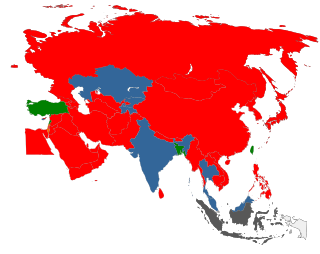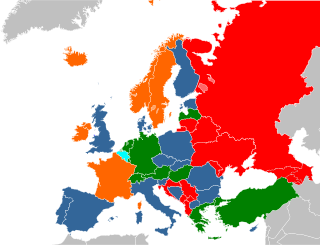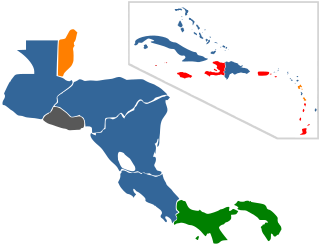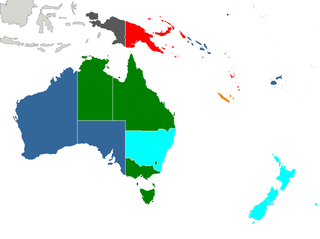Related Research Articles

The legality of prostitution in Asia varies by country. There is often a significant difference in Asia between prostitution laws and the practice of prostitution. In 2011, the Asian Commission on AIDS estimated there were 10 million sex workers in Asia and 75 million male customers.
Prostitution in Myanmar is illegal, but widespread. Prostitution is a major social issue that particularly affects women and children. UNAIDS estimate there to be 66,000 prostitutes in the country.
Prostitution in Greece is legal at the age of 18, and regulated. It is estimated that fewer than 1,000 women are legally employed as prostitutes and approximately 20,000 women, half of whom are of foreign origin and the other half are Greek, are engaged in illegal prostitution. Many women affected by the economic crisis have turned to prostitution through poverty.
Prostitution in Guatemala is legal but procuring is prohibited. There is an offence of “aggravated procuring” where a minor is involved. Keeping a brothel is not prohibited.
Prostitution in Paraguay is legal for persons over the age of 18, but related activities such as brothel keeping are prohibited. Prostitution is common in the country. Brothels are also common, even some rural villages have a small bar/brothel on the outskirts.
Prostitution in Georgia is illegal but widespread, particularly in the capital, Tbilisi. Many NGO's attribute this to the harsh economic conditions according to the US State Department. Prostitution occurs on the streets, in bars, nightclubs, hotels and brothels. UNAIDS estimate there are 6,525 prostitutes in Georgia.
Prostitution in Kazakhstan is itself legal, but acts facilitating prostitution, such as operating a brothel or prostitution ring, are illegal. Forced prostitution and prostitution connected to organised crime are prohibited. Prostitution is a serious problem. NGOs reported that criminal prostitution rings often included local law enforcement officials.
Prostitution in Lebanon is nominally legal and regulated. However, no licences have been issued since 1975. In modern Lebanon, prostitution takes place semi-officially via 'super night clubs', and illegally on the streets, in bars, hotels and brothels. UNAIDS estimate there to be 4,220 prostitutes in the country.

The legality of prostitution in Europe varies by country.
Prostitution in Azerbaijan is illegal but common. Prostitution is an administrative offence and punishable by a fine. Keeping a brothel is a criminal offence and punishable by up to 6 years' imprisonment. In 2017 a draft law proposing to add heavy fines to the punishment for keeping a brothel was before the National Assembly. It has been estimated that there are 25,054 prostitutes in Azerbaijan, some of which are aged 15 to 18.

The legal status of prostitution in Africa varies widely. It is frequently common in practice, partially driven by the widespread poverty in many sub-Saharan African countries, and is one of the drivers for the prevalence of AIDS in Africa. Senegal and Côte d'Ivoire permit the operations of brothels. In other countries, prostitution may be legal, but brothels are not allowed to operate. In some countries where prostitution is illegal, the law is rarely enforced.

Prostitution laws varies widely from country to country, and between jurisdictions within a country. At one extreme, prostitution or sex work is legal in some places and regarded as a profession, while at the other extreme, it is considered a severe crime punishable by death in some other places. A variety of different legal models exist around the world, including total bans, bans that only target the customer, and laws permitting prostitution but prohibiting organized groups, an example being brothels.
Prostitution in Kyrgyzstan has been legal since 1998, but the operation of brothels, pimping, and recruiting persons into prostitution are illegal, with penalties of up to five years There are estimated to be 7,100 sex workers in the country. Prostitution occurs on the streets, in bars, hotels and brothels.
Prostitution in Uzbekistan is illegal, but prostitution has increased within the country since the collapse of the Soviet Union. UNAIDS estimated there to be 22,000 sex workers in the country in 2019. Many of the women have turned to prostitution in Uzbekistan because of poverty.
Prostitution in Tajikistan is legal, but related activities such as soliciting, procuring and brothel keeping are prohibited. Prostitution has increased within the country since the collapse of the Soviet Union. UNAIDS estimate there are 14,100 female sex workers in Tajikistan. Government official figures for 2015 were 1,777 prostitutes and 194 brothels. Prostitution occurs on the streets and in bars, restaurants, nightclubs and saunas, and HIV prevalence is 3.5% amongst sex workers.
Prostitution in East Timor is legal, but soliciting and third party involvement for profit or to facilitate prostitution is forbidden. Prostitution has become a problem since the country gained independence from Indonesia in 2002, especially in the capital, Dili. There are estimated to be 1,688 sex workers in the country.

Prostitution is legal in Macau unlike in mainland China, because the city is a special administrative region of the country. However, operating a brothel and procuring are both illegal in Macau, with the latter punishable by a maximum jail sentence of 8 years. Street prostitution is illegal but sex work in a massage parlor is considered to be de facto legal. The city has a large sex trade despite there being no official red-light district. In addition to street prostitution, prostitutes work in low-rent buildings, massage parlours and illegal brothels, and the casinos, nightclubs, saunas and some of the larger hotels. Most hotels, however, have suspected prostitutes removed from the premises. Many of the city's sidewalks and underpasses are littered with prostitutes' calling cards.

Legality of prostitution in the Americas varies by country. Most countries only legalized prostitution, with the act of exchanging money for sexual services legal. The level of enforcement varies by country. One country, the United States, is unique as legality of prostitution is not the responsibility of the federal government, but rather state, territorial, and federal district's responsibility.

Prostitution in Oceania varies greatly across the region. In American Samoa, for instance, prostitution is illegal, whereas in New Zealand most aspects of the trade are decriminalised.
Prostitution in Fiji is legal, but most activities connected with it are illegal: brothel keeping, pimping and buying or selling sex in public. Street workers make up the bulk of Fiji's prostitutes. Many of the prostitutes are Asian, especially Chinese that provide sexual services for the growing number of tourists arriving in the country and also locals. Some come into the country on student visas. In 2014, it was estimated that there were 857 sex workers in Fiji. Even though buying and selling sex in public is illegal in Fiji, police have no legal authority to arrest prostitutes without an official report being lodged for the police to take action.
References
- 1 2 "The Legal Status of Prostitution by Country". ChartsBin. Retrieved 31 January 2018.
- 1 2 Ditmore, Melissa Hope (2006). Encyclopedia of prostitution and sex work. Westport, Conn.: Greenwood Press. ISBN 978-0313329685.
- 1 2 3 4 5 6 Preiherman, Yauheni (13 June 2012). "Minsk Police Cracks Down On Prostitution in Elite Clubs". BelarusDigest. Retrieved 1 February 2018.
- ↑ "On Amending Certain Codes of the Republic of Belarus to Increase Liability for Human Trafficking and Other Related Offences". Republic of Belarus. April 2003. Retrieved 1 February 2018.
- ↑ "Sex workers: Population size estimate - Number, 2016". www.aidsinfoonline.org. UNAIDS. Archived from the original on 4 April 2019. Retrieved 21 July 2018.
- 1 2 3 4 "Belarus 2017 Trafficking in Persons Report". U.S. Department of State. Archived from the original on 3 July 2017. Retrieved 1 February 2018.
 This article incorporates text from this source, which is in the public domain .
This article incorporates text from this source, which is in the public domain . - 1 2 "Блуд пянежны (прастытуцыя)". Sipb.pl.tl (in Russian). Retrieved 29 May 2017.
- 1 2 3 "Прастытуцыя ў Беларусі робіцца і мужчынскім заняткам". Nn.by (in Russian). 23 February 2011. Retrieved 29 May 2017.
- 1 2 ""Can't buy me love!" Or not?". Minsk Herald. Retrieved 1 February 2018.
- ↑ Antonov, Mikhail; Bomko, Vladimir (1 July 2009). "Russia bans all gambling and shuts casinos". Reuters. Retrieved 1 February 2018.
- ↑ Smok, Vadzim (26 August 2013). "Minsk Police Cracks Down On Prostitution in Elite Clubs". BelarusDigest. Retrieved 1 February 2018.